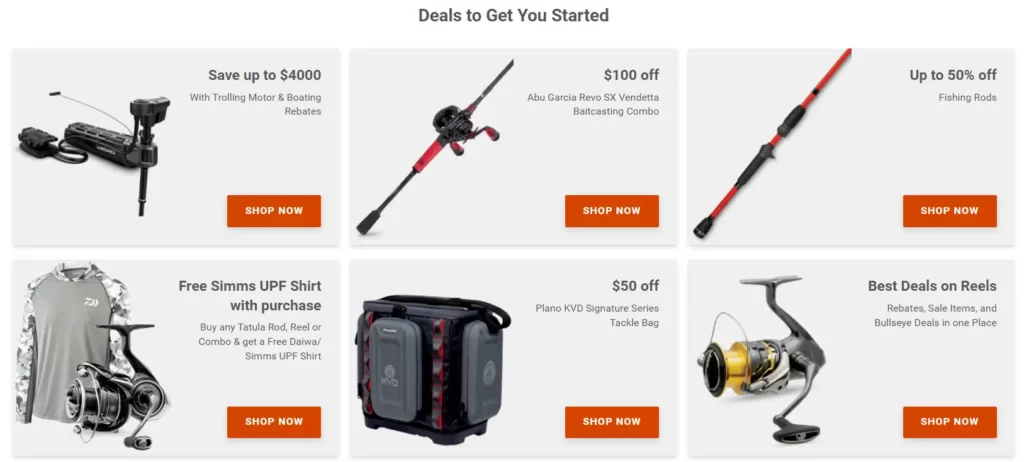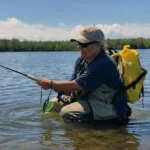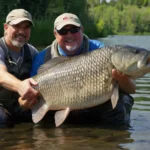Explore Canada's Ultimate Fishing, Hunting, and Wildlife Adventures

Master Saltwater Fishing: Ultimate Guide for Anglers
Key Takeaways
🎣 Welcome to the ultimate guide for saltwater fishing, covering everything from gear to techniques and destinations.
🎣 Learn about essential saltwater fishing gear, including rods, reels, lines, and baits.
🎣 Discover fundamental saltwater fishing techniques like casting, trolling, and bottom fishing.
🎣 Explore top saltwater fishing destinations, such as the Florida Keys, Costa Rica, and the Bahamas.
🎣 Gain insights into specialized techniques for specific species, like tuna, marlin, snapper, and grouper.
Welcome to the ultimate guide for saltwater fishing.
Whether you are a seasoned angler or a beginner, this guide is designed to provide you with the foundational knowledge and techniques necessary to excel in saltwater fishing.
Disclosure: When you purchase a service or a product through our links, we sometimes earn a commission, at no extra cost to you.
Fishing in saltwater offers a unique and thrilling experience, with the opportunity to catch a wide variety of species and explore some of the world’s most beautiful and pristine waters.
In this guide, we will cover everything from the basics of saltwater fishing gear and techniques to advanced tips and specialized techniques for targeting specific species. We will also offer insights into some of the best saltwater fishing destinations around the world, as well as guidance on selecting the right charters and maintaining your gear.
Furthermore, we will emphasize the importance of responsible angling, adhering to fishing regulations, and practicing proper etiquette and safety while on the water. Our goal is to provide you with a comprehensive resource that will help you make the most of your saltwater fishing adventures.
So, whether you are looking to catch your first fish or seeking to enhance your existing skills, let’s dive into the world of saltwater fishing together!
Disclosure:
When you purchase a service or a product through our links, we sometimes earn a commission, at no extra cost to you.
Table of Contents
Saltwater Fishing Basics
Saltwater fishing is a thrilling activity enjoyed by anglers worldwide. To get started, it’s essential to have the right gear and techniques. In this section, we’ll cover the fundamentals of saltwater fishing, including gear and techniques to help you catch more fish.
Saltwater Fishing Gear
The right gear is essential for successful saltwater fishing. When selecting gear, consider the species you’ll be targeting, the location, and your skill level.
Disclosure: When you purchase a service or a product through our links, we sometimes earn a commission, at no extra cost to you.
Here are some essential items:
| Item | Description |
|---|---|
| Rod | A saltwater fishing rod should be sturdy and durable. Look for rods made of materials like graphite and fiberglass that can withstand the elements. |
| Reel | Look for reels with a corrosion-resistant design to withstand saltwater environments. A reel’s gear ratio should be compatible with your rod to ensure optimal performance. |
| Line | Saltwater fishing lines should be strong and durable, with high abrasion resistance and low memory. Braided lines are ideal for saltwater fishing. |
| Lures and Baits | Look for lures and baits that mimic the prey of your target species. Common options include jigs, soft plastics, and live bait. |
Saltwater Fishing Techniques
The techniques used in saltwater fishing can vary depending on the species and location. Here are some fundamental techniques to get started:
Fly to Your Canadian Fishing Paradise
Book cheap flights to Canada's best fishing spots!
One search, all flights
Find the best deals to your favorite fishing spots
Kiwi.com Guarantee
Travel worry-free with our protection
Trusted by millions
Join anglers booking cheap flights with ease
Disclosure: When you purchase a service or a product through our links, we sometimes earn a commission, at no extra cost to you.
- Casting: This technique involves using your rod to cast your line out into the water. It’s essential to time your cast correctly and use enough force to get your line where you want it.
- Trolling: Trolling involves dragging lures or baited hooks behind a moving boat to entice fish. It’s an effective technique for covering a large area.
- Bottom fishing: This technique involves fishing on the bottom of the ocean floor. It’s effective for catching bottom-dwelling species like grouper and snapper.
With the right gear and techniques, you’ll be well on your way to mastering saltwater fishing. In the next section, we’ll explore some of the top saltwater fishing destinations around the world.
Best Saltwater Fishing Destinations
Saltwater fishing enthusiasts are always in search of new locations to explore. Whether it’s the thrill of catching a trophy fish or the tranquility of being on the water, anglers have plenty of excellent options to choose from.
Top Saltwater Fishing Destinations
| Location | Famous For |
|---|---|
| Florida Keys | Tarpon, Bonefish, Redfish, and Snook |
| Costa Rica | Marlin, Sailfish, Dorado, and Roosterfish |
| Alaska | Salmon, Halibut, and Trout |
| Bahamas | Bonefish, Tarpon, and Permit |
| Maldives | Tuna, Giant Trevally, and Sailfish |
These locations are renowned for their abundance of fish and breathtaking scenery. However, it’s important to keep in mind that each location has its own regulatory framework and local customs. Make sure to do sufficient research and follow local rules and guidelines to ensure a safe and enjoyable experience.
Understanding Saltwater Fishing Species
When it comes to saltwater fishing, understanding the different species is crucial in order to have a successful trip. Each species has its own unique characteristics, behaviors, and preferred habitats. Below are some of the most popular game fish species that are sought after by saltwater anglers:
| Species | Characteristics | Preferred Habitat |
|---|---|---|
| Tuna | Fast-swimming and powerful, with excellent eyesight and hearing. | Open ocean and offshore reefs |
| Marlin | One of the largest and fastest fish in the ocean, known for their acrobatic jumps and long runs. | Open ocean near the surface, especially around structure such as reefs. |
| Sailfish | Fast-swimming fish with a distinctive sail-like dorsal fin that they use to confuse and trap prey. | Offshore waters, often near the surface. |
| Dorado (Mahi-Mahi) | Brightly colored fish with a long dorsal fin that can change color depending on their mood. | Near the surface in warm waters around floating debris or weed lines. |
| Snapper | Popular game fish known for their good eating and tenacity when hooked. | Coral reefs, shipwrecks, and rocky bottoms. |
| Grouper | Large and aggressive fish with powerful jaws and sharp teeth. | Coral reefs, shipwrecks, and rocky bottoms. |
While these are some of the most sought-after species, there are many others that are targeted by saltwater anglers. Each species requires different techniques and gear, so it’s important to do your research before heading out to sea.
Essential Saltwater Fishing Equipment
When it comes to successful saltwater fishing, having the right equipment is crucial. But with so many options available, choosing the right gear can be overwhelming.
Here are some of the essential items that every saltwater angler needs in their arsenal:
Rod and Reel
The rod and reel are the backbone of your fishing setup. Choose a rod that is strong yet sensitive enough to detect bites, and select a reel that can handle the weight and fighting power of the fish you are targeting. Make sure the rod and reel are compatible in terms of size and line weight.
Fishing Line
Choose a strong and durable fishing line that can withstand the saltwater environment. Monofilament, fluorocarbon, and braided lines are all popular choices for saltwater fishing.
Leaders and Terminal Tackle
Leaders and terminal tackle, such as swivels, snaps, and hooks, are essential for saltwater fishing. These items connect your line to your bait or lure and help prevent line breakage.
Bait and Lures
Bait and lures are critical for attracting and catching fish. Live bait such as shrimp or baitfish can be effective, as well as artificial lures such as jigs, spoons, and topwater plugs. Choose bait and lures that match the size and type of fish you are targeting.
Fishing Accessories
Additional accessories such as pliers, scissors, and a tackle box can make your fishing trip more convenient and efficient. Pliers can help you remove hooks from fish and cut fishing line, while a tackle box can keep your gear organized and easily accessible.
Safety Equipment
Lastly, safety equipment such as life jackets and first aid kits are crucial for any fishing trip. It is important to prioritize safety and be prepared for any emergencies that may arise.
Choosing the Right Saltwater Fishing Charters
Booking a saltwater fishing charter is an excellent way to experience the thrill of fishing without having to worry about navigating unfamiliar waters or purchasing your own equipment. However, with so many options available, it can be challenging to decide which charter is best for you. Here are a few factors to consider:
Reputation
Before booking a charter, it’s important to do your research and ensure that the company you choose has a strong reputation. Look for reviews and feedback from previous customers to get an idea of the quality of service and the likelihood of a successful fishing trip.
Experience and Expertise
Experienced charter companies can make all the difference when it comes to a successful fishing trip. Choose a charter that has knowledgeable and experienced guides who can help you navigate the waters and locate the best fishing spots.
Services Offered
Consider the services offered by the charter company before making a booking. Do they provide all necessary equipment, such as rods and reels, or will you need to bring your own? Are there additional services, such as cleaning and filleting fish, that you may want to take advantage of?
Location
The location of the charter company is also an important factor to consider. Look for a company that is located in an area that has a reputation for excellent fishing opportunities and a wide variety of fish species.
By taking these factors into account, you can ensure that you choose the right saltwater fishing charter for your needs and have a fun and successful fishing experience.
Advanced Saltwater Fishing Techniques
For experienced anglers, mastering advanced techniques can help increase the chances of success on the water. Incorporating these techniques into your saltwater fishing arsenal can make the difference between a good day and a great one. Here are some advanced techniques to consider:
Trolling
Trolling involves dragging lures or bait behind a moving boat to entice fish to bite. To be successful, it’s essential to vary the speed and depth of the bait, as well as the distance from the boat. Experimenting with different lures and colors can also be effective in attracting more bites.
Bottom fishing
Bottom fishing involves dropping your bait to the ocean floor, where many species typically feed. This technique is best for targeting bottom-dwellers like cod, grouper, and snapper. Ensuring the bait remains in close proximity to the bottom is essential for success and may require the use of heavier tackle.
Using live bait
Using live bait is an effective technique for targeting larger saltwater fish like tuna, marlin, and sailfish. Using live bait can be more challenging than traditional lure fishing, but it can lead to more significant rewards. It’s essential to choose the right size bait and rig it appropriately to optimize your chances of success.
By mastering these advanced techniques, you can elevate your saltwater fishing game and increase the likelihood of a successful day on the water. However, always remember to practice responsible angling and adhere to saltwater fishing regulations to preserve the marine ecosystem for future generations.
Saltwater Fishing Gear Maintenance
Proper maintenance of saltwater fishing gear is vital to ensure it stays in top condition and performs optimally on the water. Neglecting maintenance can lead to reduced performance, shorter lifespan, and even safety hazards. Here are some essential tips for maintaining saltwater fishing gear:
| Tip | Description |
|---|---|
| 1 | Clean fishing reels after every use with freshwater and a soft cloth. This helps remove saltwater residues that can damage the internal mechanisms and lead to corrosion over time. |
| 2 | Rinse rods and reels with freshwater before storage. This helps remove any salt, sand, or debris that can cause damage or affect the performance of the gear. |
| 3 | Store fishing gear in a dry and cool place, away from direct sunlight or heat sources. Avoid leaving rods or reels in damp areas or exposed to harsh weather conditions. |
| 4 | Regularly inspect lines, leaders, and hooks for wear and damage. Replace any worn or rusty parts to ensure safe and effective fishing. |
| 5 | Apply reel lubricant and protectant to moving parts to maintain smooth operation and prevent corrosion. Follow the manufacturer’s instructions for proper use and application. |
In conclusion, by following these simple maintenance tips, anglers can increase the lifespan and performance of their saltwater fishing gear. Remember to check the gear before every fishing trip and address any issues promptly to ensure a safe and successful day on the water.
Saltwater Fishing Regulations and Conservation
As with any recreational activity, there are rules and regulations that must be followed to ensure the safety and preservation of the natural environment. Saltwater fishing is no exception; there are regulations in place to protect fish populations and preserve their natural habitats. Understanding these regulations is crucial for ethical and responsible angling.
Licensing Requirements
Before embarking on a saltwater fishing trip, it is important to ensure that you have the correct licensing. Licensing requirements vary based on the state, region, or country in which you plan to fish. Make sure to research the specific licensing requirements for your intended location well in advance of your trip to avoid any legal complications.
Size and Bag Limits
Most saltwater species have size and bag limits that anglers must adhere to. These limits are put in place to prevent overfishing and ensure the long-term sustainability of fish populations. Size limits are measured by the total length of the fish, while bag limits specify the maximum number of fish that can be caught and kept per angler.
| Species | Size Limit | Bag Limit |
|---|---|---|
| Red Snapper | 16 inches total length | 2 per person |
| Bluefin Tuna | 27 inches curved fork length | 1 per day or 3 per trip |
| Striped Bass | 28 inches total length | 1 per person |
Conservation Efforts
Conservation efforts are a critical part of ethical and responsible saltwater fishing. It is important to understand the potential impacts of angling on fish populations and their habitats, and to take steps to minimize these impacts. This can include practicing catch and release techniques, avoiding sensitive areas, and properly disposing of any waste or debris.
“It is our responsibility as anglers to ensure that we are not only taking care of the fish we catch but also the environment we are fishing in.”
By following these regulations and conservation efforts, anglers can ensure that saltwater fishing remains a sustainable and enjoyable activity for generations to come.
Saltwater Fishing Tips: Etiquette and Safety
When out on the water, it’s important to keep in mind proper fishing etiquette and safety guidelines. Not only does it ensure a positive experience for all, but it also promotes responsible angling and preserves the marine environment.
Fishing Etiquette
Here are some etiquette tips to keep in mind while saltwater fishing:
- Respect other anglers by giving them enough space to fish comfortably.
- Avoid littering the water with fishing gear, bait containers, or any other trash.
- Be mindful of noise levels and avoid disturbing other anglers or wildlife.
- Do not trespass on private property or areas where fishing is prohibited.
- Only keep the fish you plan on eating and release the rest to maintain sustainable fish populations.
Fishing Safety
Follow these safety tips to ensure a safe and enjoyable saltwater fishing trip:
- Wear a life jacket at all times, especially if fishing from a boat or in rough waters.
- Be aware of weather conditions and avoid fishing during storms or high winds.
- Use caution when handling sharp hooks and other fishing gear.
- Stay hydrated and apply sunscreen to protect against the sun’s harmful rays.
- Watch for any signs of fatigue or dehydration and take breaks as needed.
- Bring a first aid kit and know how to treat any fishing-related injuries.
- Always have a means of communication, such as a cell phone or radio, in case of emergencies.
“By practicing good fishing etiquette and following safety guidelines, you can enjoy a memorable and successful saltwater fishing experience.”
Saltwater Fishing Techniques for Specific Species
Saltwater fishing can vary widely depending on the species you target. Different fish have unique habits and preferences, requiring specific techniques to catch them. Here are some specialized techniques for targeting specific saltwater fish species:
Tuna
Tuna are widely regarded as one of the most challenging saltwater species to catch. To increase your chances of success, consider using live bait or trolling with lures. Tuna are known for their speed, so you’ll need a heavy-duty reel and a strong, long rod to withstand their power.
Marlin
Marlin are known for their immense size and strength, making them a popular game fish for experienced anglers. To catch a marlin, you’ll need to use a trolling method with lures or live bait. A heavy-duty reel and rod are essential, as marlin can weigh hundreds of pounds and require significant strength to reel in.
Snapper
Snapper can be found in shallow and deep waters, making them a versatile species to target. To catch them, consider using a bottom fishing technique with bait such as cut squid or shrimp. Snapper can be wary, so a stealthy approach and patience are essential.
Grouper
Grouper are bottom-dwelling fish that prefer rocky areas or deep-water reefs. To catch them, consider using a jigging technique with heavy lures or live bait. Grouper can be challenging to reel in, requiring significant strength and endurance.
Sailfish
Sailfish are known for their incredible acrobatics, making them a thrilling species to target. To catch a sailfish, consider using a trolling technique with lures or live bait. Sailfish are fast and agile, requiring a sturdy rod and reel to handle their power.
Sharks
Sharks are a challenging and dangerous species to target. Make sure to use heavy tackle and wire leaders to prevent the shark from biting through your line. Consider using a live bait technique, such as chumming the water to attract and entice the shark to bite. Always use caution and practice safety guidelines when targeting sharks.
Tips for Choosing Saltwater Fishing Rods and Reels
Choosing the right saltwater fishing rod and reel is essential for a successful fishing experience. There are a variety of factors to consider when selecting your gear, including rod length, action, reel type, and materials. Here are some tips to help you make an informed decision:
Rod Length and Action
The length and action of your rod will vary depending on the species you plan to target and the fishing technique you plan to use. Longer rods offer greater casting distance, while shorter rods provide more control and accuracy. The action of a rod refers to its flexibility, and it can be fast, medium, or slow. Fast action rods are more sensitive and ideal for larger fish, while slow action rods are better suited for smaller fish and finesse techniques.
Reel Type
When it comes to reels, there are two main types to consider: spinning and baitcasting. Spinning reels are great for beginners and versatile for a range of fishing techniques. Baitcasting reels are more advanced and provide greater accuracy and control, ideal for targeting larger fish species.
Materials
The materials used in your saltwater fishing gear will impact its durability, sensitivity, and overall performance. Look for rods made from graphite or fiberglass, as they offer strength and sensitivity. Reels made from materials like aluminum and stainless steel are durable and can handle the saltwater environment.
Additional Tips
- Consider investing in high-quality gear to ensure optimal performance and longevity
- Visit a professional fishing store to get expert advice and try out different rods and reels before making a purchase
- Match your gear to the species you plan to target and the fishing technique you plan to use
- Maintain and clean your gear regularly to ensure it performs at its best
“Choosing the right gear can make all the difference in whether you have a successful saltwater fishing trip or not. Take your time, do your research, and invest in quality gear that you can rely on.”
Tips for Choosing Saltwater Fishing Rods and Reels
Choosing the right saltwater fishing rod and reel can make all the difference in your fishing experience.
Here are some tips to help you make the best choice:
PLUSINNO Fishing Rod and Reel Combo,Fishing Pole,Telescopic Fishing Rod Kit with Spinning Reel, Telescopic Fishing Pole with Carrier Bag for Freshwater Saltwater for Men Women
Determine Your Fishing Style
Consider the type of fish you will be targeting and the fishing techniques you plan on using. This will help you determine the appropriate rod length, action, and reel type to match your fishing style.
Choose the Right Rod Length and Action
The length and action of your rod will affect your casting distance and accuracy, as well as your ability to detect bites and set the hook. Longer rods are generally better for casting distance, while shorter rods provide better accuracy. The action of your rod refers to its flexibility and how much it bends under pressure. Fast action rods bend more in the tip section, while slow action rods bend throughout the length of the rod.
Select the Proper Reel Type
There are three main types of reels to choose from: spinning, baitcasting, and conventional. Spinning reels are the most popular choice for saltwater fishing due to their versatility and ease of use. Baitcasting reels offer more control and accuracy but require more skill to use. Conventional reels are best suited for heavy-duty fishing, such as deep sea or trolling.
Consider Materials and Quality
Choose a rod and reel made of high-quality materials that can withstand the harsh saltwater environment. Look for reels with anti-corrosion features and rods made of composite materials such as graphite or fiberglass.
Test Before You Buy
Don’t be afraid to test out different rods and reels before making a purchase. This will allow you to get a feel for the equipment and ensure that it meets your needs and preferences.
By following these tips, you can choose the right saltwater fishing rod and reel for your next fishing adventure. Happy angling!
FAQ about Saltwater Fishing
Q1: What is saltwater fishing?
A: Saltwater fishing is a type of fishing that takes place in marine environments like oceans, seas, and coastal areas. It involves targeting a wide range of saltwater fish species, offering anglers unique and exciting opportunities to catch various game fish.
Q2: What gear do I need for saltwater fishing?
A: To get started with saltwater fishing, you’ll need essential gear like a sturdy saltwater fishing rod made of materials like graphite or fiberglass, a corrosion-resistant reel, strong and durable fishing line, leaders, and terminal tackle. Additionally, having the right baits and lures that mimic the prey of your target species is crucial.
Q3: What are some fundamental saltwater fishing techniques?
A: Saltwater fishing techniques vary depending on the species and location, but some fundamental ones include casting, trolling (dragging lures or baited hooks behind a moving boat), and bottom fishing (fishing on the ocean floor). These techniques are effective for targeting different types of saltwater fish.
Q4: Where are the top saltwater fishing destinations?
A: Some renowned saltwater fishing destinations include the Florida Keys (famous for tarpon, bonefish, redfish, and snook), Costa Rica (known for marlin, sailfish, dorado, and roosterfish), Alaska (ideal for salmon, halibut, and trout), the Bahamas (abundant with bonefish, tarpon, and permit), and the Maldives (home to tuna, giant trevally, and sailfish).
Q5: How can I choose the right saltwater fishing charter?
A: When selecting a saltwater fishing charter, consider factors like the charter company’s reputation, the experience and expertise of the guides, the services they offer (equipment provided, fish cleaning services, etc.), and the location of the charter company (fishing opportunities and fish species in the area).
Q6: How should I maintain my saltwater fishing gear?
A: Proper maintenance of saltwater fishing gear is essential for optimal performance and longevity. Rinse rods and reels with freshwater after each use to remove saltwater residues, store gear in a dry and cool place, inspect lines, leaders, and hooks for wear, and regularly apply reel lubricant and protectant to prevent corrosion.
Q7: What are some specialized techniques for targeting specific saltwater fish species?
A: Different saltwater fish species require specific techniques. For example, to catch tuna, consider using live bait or trolling with lures. For marlin, trolling with lures is effective. Grouper can be targeted using jigging with heavy lures or live bait. Sailfish can be caught using trolling techniques or live bait.
Q8: Are there any conservation efforts I should be aware of when saltwater fishing?
A: Yes, conservation efforts are vital to preserve fish populations and their habitats. Practice catch and release techniques, follow local fishing regulations (size and bag limits), and avoid fishing in sensitive areas. Responsible angling ensures the sustainability of saltwater fishing for future generations.
Q9: What should I consider when choosing saltwater fishing rods and reels?
A: Consider factors like the rod length and action (based on target species and fishing technique), the reel type (spinning or baitcasting), and materials that can withstand the saltwater environment, such as aluminum and stainless steel. Investing in high-quality gear and testing it before purchase is beneficial.
Q10: Where can I find additional resources to improve my saltwater fishing skills?
A: You can find informative resources like books, videos, and articles on websites, fishing forums, and video-sharing platforms like Amazon, YouTube, and fishing-specific websites. These resources provide tips, techniques, and insights to help you become a better saltwater angler.
Resources and External Links
Here are some additional resources and external links that can help you learn more about “Master Saltwater Fishing”:
Articles:
- Saltwater Fishing Basics – Fishmaster Blog
- Saltwater Fishing Tips & Techniques | Salt Water Sportsman
- Saltwater Fishing: The Ultimate Guide to Mastering Saltwater Fishing for Life! – Amazon
YouTube Videos:
- Master Saltwater Fishing – Rigs, Bait, Gear + Pro Tips and Common Mistakes – 1Fish2Fish
- Top 3 Saltwater Fishing Rigs For OFFSHORE Fishing – Nsanefishing
- Must Have Spoon For Surf Fishing – Artificial Lure Fishing From The Beach – Tight Lines & High Tides
- Saltwater Fishing Tackle Shop 101 – Best Bait and Tackle For Beach Fishing – 1Fish2Fish
These resources provide additional information and insights about “Master Saltwater Fishing”.









